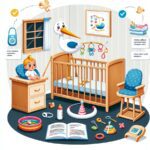Summer heat safety for newborns is a critical concern for new parents navigating the warmer months. As temperatures rise, understanding the best practices for keeping your baby cool, hydrated, and protected from the sun’s harmful rays becomes paramount. This article aims to provide a comprehensive guide to ensure your newborn enjoys a safe and happy summer.
Understanding the Risks: Why Newborns are Vulnerable in the Summer
Newborns are particularly susceptible to the summer heat due to their developing thermoregulatory system, which is not yet fully equipped to handle extreme temperatures. Unlike adults, babies cannot efficiently regulate their body temperature, making them prone to overheating and dehydration. Additionally, their delicate skin is highly sensitive to sun exposure, increasing the risk of sunburn.
Recognizing the signs of overheating in newborns is vital. Symptoms can include fussiness, redness, rapid breathing, and lethargy. If any of these signs are observed, it’s crucial to take immediate action to cool down your baby and consult a healthcare provider if necessary.
Summer Heat Safety for Newborns: Effective Strategies
To ensure summer heat safety for newborns, adopting a proactive approach is key. First and foremost, keeping newborns hydrated is essential. Breastfed babies may need more frequent feedings, while formula-fed infants might benefit from small amounts of water, as advised by your pediatrician. Ensuring your baby’s clothing is lightweight, loose-fitting, and made of breathable materials such as cotton can also help prevent overheating.
Creating a cool and comfortable environment is another crucial strategy. During peak sun hours, keep your newborn indoors or in the shade. Using a fan to circulate air (without it blowing directly on the baby) and drawing blinds or curtains during the hottest part of the day can help keep indoor spaces cooler. For outdoor excursions, consider early morning or late afternoon when the sun’s rays are less intense.
Protecting Newborns from the Sun: Beyond Sunscreen
While sunscreen is essential for older babies and adults, its use on newborns younger than six months is generally not recommended. Instead, physical barriers such as lightweight long-sleeved shirts, wide-brimmed hats, and sun shades for strollers can provide the necessary protection. When sunscreen becomes necessary for babies older than six months, choosing a formula specifically designed for infants, with a high SPF and free from harmful chemicals, is crucial.
It’s also important to be aware of the surfaces around your baby since they can reflect sunlight and exacerbate exposure. Sand, water, and even concrete can increase the risk of sunburn by reflecting UV rays. Ensuring your baby is in a shaded place, with protective barriers against reflected sunlight, is a key part of summer safety.
- Consider investing in a high-quality baby monitor to keep an eye on your baby during naps, ensuring they are comfortable and not overheating. Learn more about the best baby monitors here.
- Understanding infant CPR is vital in emergency situations, such as dehydration or heatstroke. Find a guide to infant CPR here.
- For car safety during the summer, choosing the right baby car seat that offers comfort and breathability is essential. Discover the safest car seats for newborns here.
- Sun protection is crucial for babies. Discover effective sun protection tips here.
- Keeping your baby’s environment safe and cool is paramount. Learn more about water safety during summer here.
In conclusion, summer heat safety for newborns requires awareness, preparation, and the right strategies to keep your baby cool, hydrated, and protected from the sun. By following these guidelines, you can ensure your newborn enjoys the summer months safely and comfortably.
For more information on keeping your baby safe in various conditions, visit our website at Baby Whys and Hows.













